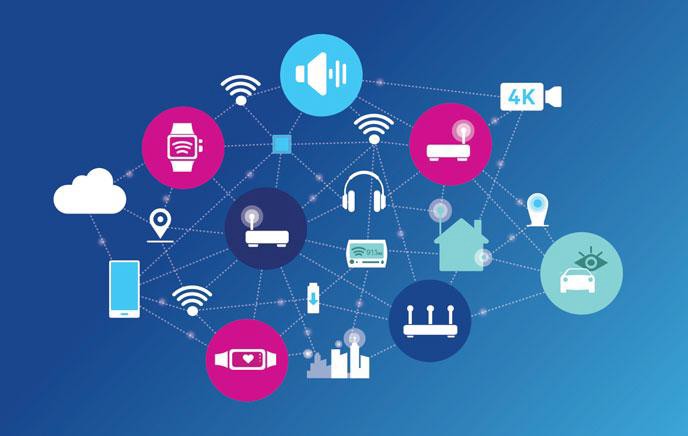Consumer brands are experiencing increased competition from Asian manufacturers and, at the same time, they are often suffering because of information asymmetry with ever-larger distribution and retail partners. Large organisations, like Amazon and, online German fashion retailer, Zalando, collect and control the data regarding customer behaviour, pricing and product preferences.
The high street is also battling the online retailers, which often have an advantage in terms of operating costs, range of products and potentially most important of all - “data”. Meanwhile, online retailers are in a “race to the bottom”, with price comparison services making it difficult to price products above the lowest price, while service levels and reputation goes largely unnoticed by the consumers. Furthermore, online retailers are also struggling with distribution costs, especially due to the high rates of returns which, for fashion retailers, can be as high as 40%. Online business is growing fast and in the USA it now accounts for over 30% of sales for retailers like Nordstrom and Macy’s.
In response to these challenges, consumer brands are increasingly looking to expand their geographical market reach, to raise their brand’s profile and to collect more data from consumers directly.
Blockchain technology can help consumer brands to accomplish some of these goals. For instance, by incentivizing consumers to scan tags on products, consumer brands can accomplish several things at once:
Provide more information about the product such as provenance data and exclusive content, with the intent to increase the brand value
Collect data directly from the end user e.g. through surveys and quizzes
Reward brand loyalty e.g. through loyalty programs or cashback.
Incentivize consumers to refer the brand and products to their friends
Create cross-selling opportunities e.g. selling insurance or service agreements
Blockchain technology can ensure that reliable data is provided, e.g. regarding provenance, and makes these reward-based marketing solutions cost-efficient, even when “rolling them out” on a global basis. No more need to deal with multiple local currencies and no need to run a complex system to manage the loyalty program balances and transactions. All data is securely stored on a Blockchain, and interoperability between the various systems is possible. For example, Loylogic, which was established in 2005, has a global network of more than 500 retailers and 2,000 online stores offering millions of products and services linked to various loyalty reward schemes.
Retailers can benefit from Blockchain technology in much the same way. They can use similar reward-based marketing techniques to improve customer engagement and data collection. High street retailers can incentivize consumers to visit their stores, not by giving discounts, but by providing more value in terms of rewards, more exclusive products and those controlling access to a more exclusive experience.
For instance, a football shirt sold in a store using Near Field Communication (NFC) can offer exclusive video content from the player, or an exclusive item for an “Esports game”, whereas the same shirt bought online does not come with these value-added features. So, if you want to be Ronaldo in FIFA 20 on your PlayStation, then you have to go to the...
Consumer brands are experiencing increased competition from Asian manufacturers and, at the same time, they are often suffering because of information asymmetry with ever-larger distribution and retail partners. Large organisations, like Amazon and, online German fashion retailer, Zalando, collect and control the data regarding customer behaviour, pricing and product preferences.
The high street is also battling the online retailers, which often have an advantage in terms of operating costs, range of products and potentially most important of all - “data”. Meanwhile, online retailers are in a “race to the bottom”, with price comparison services making it difficult to price products above the lowest price, while service levels and reputation goes largely unnoticed by the consumers. Furthermore, online retailers are also struggling with distribution costs, especially due to the high rates of returns which, for fashion retailers, can be as high as 40%. Online business is growing fast and in the USA it now accounts for over 30% of sales for retailers like Nordstrom and Macy’s.
In response to these challenges, consumer brands are increasingly looking to expand their geographical market reach, to raise their brand’s profile and to collect more data from consumers directly.
Blockchain technology can help consumer brands to accomplish some of these goals. For instance, by incentivizing consumers to scan tags on products, consumer brands can accomplish several things at once:
-
Provide more information about the product such as provenance data and exclusive content, with the intent to increase the brand value
-
Collect data directly from the end user e.g. through surveys and quizzes
-
Reward brand loyalty e.g. through loyalty programs or cashback.
-
Incentivize consumers to refer the brand and products to their friends
-
Create cross-selling opportunities e.g. selling insurance or service agreements
Blockchain technology can ensure that reliable data is provided, e.g. regarding provenance, and makes these reward-based marketing solutions cost-efficient, even when “rolling them out” on a global basis. No more need to deal with multiple local currencies and no need to run a complex system to manage the loyalty program balances and transactions. All data is securely stored on a Blockchain, and interoperability between the various systems is possible. For example, Loylogic, which was established in 2005, has a global network of more than 500 retailers and 2,000 online stores offering millions of products and services linked to various loyalty reward schemes.
Retailers can benefit from Blockchain technology in much the same way. They can use similar reward-based marketing techniques to improve customer engagement and data collection. High street retailers can incentivize consumers to visit their stores, not by giving discounts, but by providing more value in terms of rewards, more exclusive products and those controlling access to a more exclusive experience.
For instance, a football shirt sold in a store using Near Field Communication (NFC) can offer exclusive video content from the player, or an exclusive item for an “Esports game”, whereas the same shirt bought online does not come with these value-added features. So, if you want to be Ronaldo in FIFA 20 on your PlayStation, then you have to go to the Juventus store, buy his football shirt there, scan the QR code and get a digital token which unlocks the feature in the game. Therefore, one can see that this will incentivize consumers to visit the Juventus store, as opposed to buying online!
Also, consumer brands can benefit from supporting high street initiatives, as consumers tend to spend more money than online shoppers, and an improved “high street experience” can help to increase brand value and brand loyalty. Blockchain technology provides the necessary glue between consumer brands and the high street to make such joint initiatives viable.
The “rewards, not discounts” philosophy can, therefore, help improve margins, while offering an enhanced customer experience and build loyalty, so encouraging repeat purchase. For instance, in Holland, retailers use dynamic pricing to lower the price of products that are nearing their expiration dates. While reducing waste is a lofty goal, the potential problem is that consumers often perceive lower-priced goods as having a lower quality. An alternative would be to maintain the normal price level while offering a higher reward in digital tokens - the closer the product is to the expiration date. This incentivises the consumer to help reduce waste, without them be aware, and without undermining the perceived product quality.
Importantly, retailers will be able to automatically collect data about waste reduction and also the number of participating consumers. By using a public Blockchain, this structured data can be used by others to verify claims made by the retailer, aggregating data to gain more insights. This kind of transparency regarding Corporate Social Responsibility programs can also improve the brand equity of the retailer. An example of this is the work being done by Volkswagen and Zalando who have been looking at how they can use Blockchain technology to make supply chains more transparent and sustainable.
Equally important is being able to demonstrate “green/environmental credentials”, as many pension funds are asking for such evidence before they invest in a company.
Blockchain technology is increasingly being used by retailers and manufacturers to help drive consumers back to High Streets, build greater engagement and loyalty between shoppers, brands and retailers, and potentially reduce the environmental impact of the retail sector.
 Consumer brands and retailers are under continued pressure from many different sides concurrently.
Consumer brands and retailers are under continued pressure from many different sides concurrently. 





